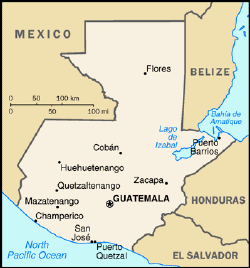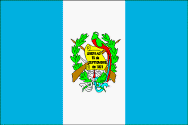The
Hofstede analysis for Guatemala is similar to it’s Latin
American neighbors. Uncertainty avoidance ranks highest which
indicates a high concern for rules, regulations,
controls and issues with
career security – typically, a society that does not
readily accept change and is risk adverse. Guatemala also
has a high
power distance ranking which indicates that inequalities
of power and
wealth have been allowed to grow within society. Individualism
ranks extremely low which signifies a society of a more collectivist
nature and strong relationships where everyone takes responsibility
for fellow members of their group.
Guatemala
is similar to many Latin American countries when
analyzing Hofstede's Dimensions
(see Latin America Hofstede Graph below).
Guatemala
has the highest Uncertainty Avoidance (UAI) Hofstede
Dimension ranking of all Latin countries
at 101, indicating the society’s extremely
low level of tolerance for uncertainty. In an effort
to minimize or reduce this level of uncertainty,
strict rules, laws, policies, and regulations are
adopted and implemented. The ultimate goal of this
population is to control everything in order to eliminate
or avoid the unexpected. As a result of this high
Uncertainty Avoidance characteristic, the society
does not readily accept change and is very risk adverse.
Guatemala also is tied with Panama for the highest
Power Distance (PDI) ranking among Latin countries
with a 95, compared to an average of 70. This is
indicative of a high level of inequality of power
and wealth within the society. This condition is
not necessarily subverted upon the population, but
rather accepted by the culture as a whole.
Guatemala
has the lowest Individualism (IDV) ranking at 6,
compared to other Latin countries (average 21).
The score on this Dimension indicates the society
is
Collectivist as compared to Individualist. This
is manifest in a close long-term commitment to the
member
'group', be that a family, extended family, or
extended relationships. Loyalty in a collectivist
culture
is paramount, and over-rides most other societal
rules and regulations. The society fosters strong
relationships where everyone takes responsibility
for fellow members of their group.
Of special note is that Guatemala has the largest
divergence of Power Distance (PDI) to Individualism
(IDV) of any country surveyed in the world, with
a difference of 89 (PDI-95 minus IDV-6 = 89). Panama
is next with 84 and Malaysia third with 78.
In
many of the Latin American countries, including
Guatemala, the population is predominantly Catholic
(see Religions Graph below). The combination of Catholicism
and the cultural dimensions, shown in the Hofstede
Graphs above, reinforce a philosophy predicated in
the belief that there is an absolute ‘Truth”.
As Geert Hofstede explains about peoples with a high
Uncertainty Avoidance Index, their attitude is, “There
can only be one Truth and we have it.”
In
a country that has over 50% of its population practicing
the Catholic religion, we found the
primary correlating Hofstede Dimension to be Uncertainty
Avoidance (UAI). There were only 2 countries out
of 23 that did not follow this correlation, they
were Ireland and the Philippines.
Based on our studies and data, the large majority
of predominantly Catholic countries (those with Uncertainty
Avoidance as their highest ranking Dimension) have
a low tolerance for ambiguity. This creates a highly
rule-oriented society that institutes laws, rules,
regulations, and controls in order to reduce the
amount of uncertainty within the population. More Details
Written
by Stephen Taylor - the Sigma Two Group



